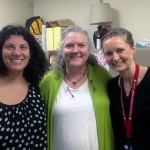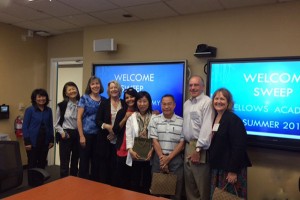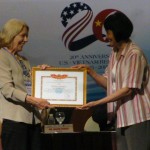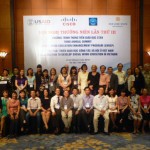- Karly Comfort, right, poses for a photo with her internship advisors. She received a Graduate Equity Fellowship to support her completion of a master’s in social work. Photo courtesy of Karly Comfort
- Xochlit Garcia poses in her cap and gown as she prepares to graduate with a master’s in counseling education. Photo courtesy of Xochlit Garia
As a working mom and full-time student, Xochlit Garcia said it was a sacrifice to enroll in graduate school. Garcia is one of several SJSU students who received 2015-16 Graduate Equity Fellowships. The program provides a scholarship of $1,000 to $3,000 to offset the cost of tuition and also provides a faculty mentor component to help students focus on their career objectives.
“Between family, school and interning, it has helped me keep my mind on track and focus,” she said. “I’m not worried about paying additional tuition.”
Garcia, who works on the weekends, is finishing her master’s in counseling education in the Connie L. Lurie College of Education this semester and working towards a Pupil Personnel and Services credential that requires 600 internship hours.
“One of my biggest challenges has been trying to support my family in terms of time and money – juggling both those things,” she said. “The scholarship makes life a lot easier.”
She also appreciates the faculty mentor component of the program and has worked closely with Dr. Jason Laker.
“It’s good to have a mentor to discuss academic plans and the steps to achieve that,” said Garcia, who graduates in May.
Karly Comfort, a master’s of social work student in the College of Applied Sciences and Arts, also completes her degree this spring. She especially appreciated having a faculty mentor. She worked with Dr. Peter Allen Lee, who helped her think critically about how the work done in classes applies to real-world situations. Comfort said the fellowship allowed her to put in many internship hours that have provided practical experience. SJSU’s Four Pillars of Student Success student engagement pillar aims to increase high-impact practices such as mentor programs and internships.
“It was a huge part of my professional development,” she said. “A lot of school learning is theoretical, but when we get to be in the field we really learn the skills you need to be a social worker.”
Comfort interned with a mental health family enrichment program working with children ages 0 to 5 on building parent-child relationships through play and with Lucile Packard Children’s Hospital, where she rotated through different departments. Her experiences at SJSU prepared her for a position at a health clinic in east San Jose where she will begin working in June.
Applications are now being accepted for the 2016-2017 Graduate Equity




